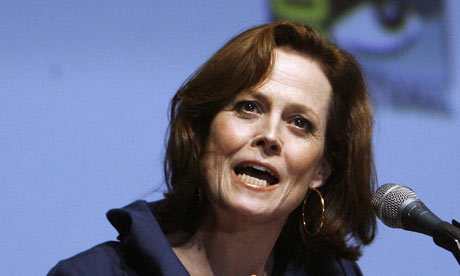
As the panellists walked on stage for the Wonder Women talk at Comic-Con yesterday (subtitled "female power icons in pop culture") it was interesting to see the various levels of famous; Eliza Dushku, formerly of Buffy and now star of Joss Whedon's Dollhouse, got a good round of applause. Zoe Saldana, the new Uhura, got lots of claps and growing number of "whoop whoop whoooooooo!", noises. Elizabeth Mitchell, from Lost, received both whoops and several cheers of "Lost! Lost! Lost!".
And then? Ripley beat them all. And so she should, being the best female action hero ever despite it being 30 years since Alien was released. Sigourney Weaver got a standing ovation for simply walking on stage - and from that point until the end of the panel, the air was crackling with bright little flashbulb hiccups and the little electric cla-chuk of 4,000 digital cameras taking 400,000 pictures of a stage that felt as if it was 40 miles away.
Weaver was passionate in her belief that female action stars - and powerful female roles in general – should be action stars and roles first, and female depending on whoever was best for the role.
"Science fiction is an investigation into what it is to be human," she said at one point. "A lot of the roles I have played, they're not trying to create a female action figure - they're trying to create a fully-functioning human being; a character comes first."
Of Ripley she said, "I was playing a person: people want things, believe in things. I am grateful, though that when we started out, I got to wear clothes. Real clothes.
"I think my issue was what people were always looking for was someone who was 5'2" and petite and blonde and I couldn't possibly do that, I would tower over these leading men" - and she patted the shoulders of the tiny, younger actors to her side. "I get sent roles now, but still, men's roles - because society is changing faster than Hollywood moves and can understand."
The question of appearance ended up being one of the key points of debate.
Saldana, already all the rage thanks to her turn in the Star Trek reboot, was by this point becoming more popular by the second thanks to her intelligence and articulacy on the panel.
"It's about how long I have to stand fighting a room full of men about why I should do a fight scene in trousers, where I'm required to run across a floor and leap on to a moving elevator," she argued, "They're confused because they're convinced I should be just as good at doing that in a leather miniskirt and Gucci boots."
Dushku, meanwhile, came across as somebody who wanted to be both powerful and frequently score roles that being a young, striking woman allowed her to play. She talked of having a character that was able to sell sex - to use, as she put it, her feminine wiles.
"I asked Joss for the most kick-ass multi-dimensional character he could think of, and he delivered ... this character, it's just a lot like me."
So is the problem in the writing, the casting, or what the audience demands and understands?
Lessons here:
1. Soldana has her head truly on her shoulders in terms of what's going on, as well as her ability to connect to an audience.
2. Age is also an issue. Elizabeth Mitchell: "My roles have been far more adventurous, far more interesting, once I moved beyond 30; my roles are juicer, and sexier, and more powerful - we're allowed to do all those things, be all those things, once we pass 30."
But, and this was a point that both she and Saldana touched upon, these roles are more likely to be in TV than on film. It seems to take ideas longer to filter through Hollywood than through TV, and riskier casting, they suggested, is more likely to happen on the small screen than the big.
This was all wrapped up when someone brought the title back into play. If this was all about Wonder Woman, why wasn't there a Wonder Woman movie (Dushku, the most likely to know what the hold-ups on Whedon's planned project, wasn't saying anything, if she knew). Could there be a 35-year-old Wonder Woman? Or even a 45-year-old one? Or would she have to be 25, like so many other roles?
The affectionate crowd could have named Soldana Wonder Woman on the spot, who responded with a thoughtful critique: "65-year-old men want to see 25-year-old women. And they're the people that are cutting the cheques, they're the people that are making the decisions, and until we change that - until they allow a younger segment of the audience to have a say in those decisions that's going to continue to be the way." "I think it's a mistake to look to Hollywood as the bringer about of socio-economic, sociological change," said Weaver. "It's about your writing the scripts, leading them by the nose into making the decisions that actually, and accurately, represent the feelings of the audience."
Or as Saldana put it - you have to ask. The fans have to say they want something different when it comes to casting women in supernatural or super-powerful roles.
But that just makes you wonder whether it's wishful thinking on the part of female actors. After all, when the super-fans typical of Comic-Con want something, they are not backward in coming forward. Perhaps they are already getting what they want.

